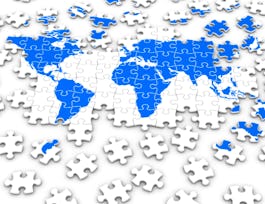After this course you will be an Earth Economist that can provide evidence-based advise on the best global policy. As an Earth Economist you will better understand the behavior and advice of economists, have become a better economist yourself and know where to find Earth's data and how to analyze these world observations. Our planet is too important: we need you to get engaged!



Earth Economics


Instructors: Peter A.G. van Bergeijk
Sponsored by PTT Global Chemical
10,903 already enrolled
(79 reviews)
Recommended experience
What you'll learn
Become a good economist that understands under which conditions an economic theory applies and can be used to inform evidence-based policy making
Skills you'll gain
Details to know

Add to your LinkedIn profile
8 assignments
See how employees at top companies are mastering in-demand skills


Earn a career certificate
Add this credential to your LinkedIn profile, resume, or CV
Share it on social media and in your performance review

There are 6 modules in this course
Earth Economics offers a completely new angle to policy analyses by its focus on the truly global level and its empirical orientation on very recent data. Each week offers "Reflections on the economic impact of the Corona virus" (COVID-19) allowing you to apply what you have learned. But we have to look beyond the pandamic. Sustainability (environmental and related to the UN's SDGs), equality and hetrodox (non mainstream) views on the economy are important for an Earth Economist. Taking stock of emerging planet data and analyzing policies during and following the Global Crisis, Earth economics provides both a topical introduction into basic macroeconomic tools and concepts and insights in highly relevant problems and recent developments in planet production, growth and governance. You will also better understand the behavior and advice of economists, become a better economist and know where to find Earth's data and how to analyse these world observations. Our planet is too important: we need you to get engaged!
What's included
2 videos3 readings1 assignment1 discussion prompt
This set of three lectures provides you with a good introduction to the most often used data sources for the Earth Economy and their strengths and weaknesses. We study which activities generate value added and discuss both the merits and the drawbacks of the concept of Gross Planet Product (GPP). We will get a good idea about changes in the economic condition of our planet, both from business cycles and from changes in the world's unemployment rate. You will discover that economists are too optimistic about the reliability of their data but also that economist in the past have been too pessimistic about the development of the world economy.
What's included
6 videos7 readings1 assignment1 discussion prompt
We start with a discussion of the equilibrium concept and relate (in)stability to policy relevant questions such as (over)population, global warming and hyperinflation. We encounter comparative statics and scenario analysis. We discuss investment, saving and consumption and relate these concepts to the development of the Earth economy. At the end of these three lectures you will be able to build a model of the Earth economy and use that model to analyze the Great Recession of 2008/0. That is pretty cool.
What's included
7 videos7 readings2 assignments
In this Module we take a closer look at government. We study government spending and taxation and will discover any instances where government expenditures and receipts move in the same direction. An important issue is the development of public debt that has reached unprecedented levels for our planet. Finally we study money and its functions in the Earth Economy.
What's included
6 videos7 readings1 assignment
In this module we look at the money market and the role and impact of monetary policy. We start with the liquidity trap where interest rates are so low that monetary policy becomes impotent. Next we relate the money market and the product market in the so-called ISLM model. We use this model to shed light on economic debates about the role of government.
What's included
5 videos6 readings1 assignment
Earth Economics is especially relevant when we take a look at the long run because it enables us to analyse sustainability of economic processes and to understand how productivity is key for economic development. We will discover why Earth Economics is important for monitoring and understanding Sustainable Development Goals from a truly global perspective
What's included
5 videos6 readings2 assignments1 peer review
Instructors


Offered by
Why people choose Coursera for their career




Learner reviews
79 reviews
- 5 stars
75.94%
- 4 stars
15.18%
- 3 stars
6.32%
- 2 stars
2.53%
- 1 star
0%
Showing 3 of 79
Reviewed on Oct 4, 2022
i enjoy this class. This class opened my eyes about our earth and how we use resources.
Reviewed on Jul 24, 2020
It's a very informative course, very useful and we can follow the syllabus
Reviewed on Aug 11, 2022
Great learning! I'm an alumnus of ISS -Erasmus Rural Policy and Project Planning batch 1995. Hopefully, I'll visit Netherlands again! I missed The Hague.
Recommended if you're interested in Social Sciences

University of Michigan

Parsons School of Design, The New School

EDHEC Business School

Universiteit Leiden

Open new doors with Coursera Plus
Unlimited access to 10,000+ world-class courses, hands-on projects, and job-ready certificate programs - all included in your subscription
Advance your career with an online degree
Earn a degree from world-class universities - 100% online
Join over 3,400 global companies that choose Coursera for Business
Upskill your employees to excel in the digital economy


